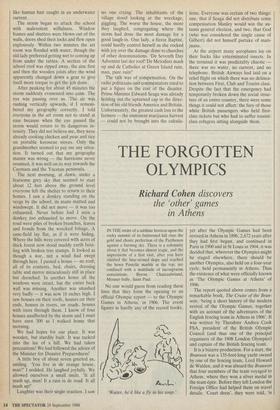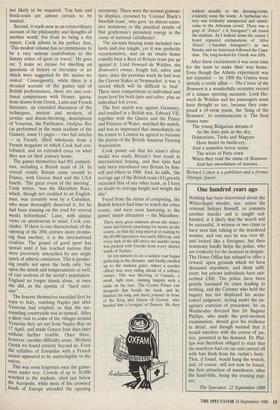THE FORGOTTEN OLYMPICS
Richard Cohen discovers the 'other' games in Athens
IN THE midst of a sublime horizon upon the rocky summit of its buttressed hill rises the gold and chaste perfection of the Parthenon against a burning sky. There is a solemnity about it that becomes almost tragic, and the impressions of a first visit, after you have climbed the lime-stoned slope and reached the hewn Pentelic marble at the top, are confused with a multitude of incongruous
associations, Byron, Chateaubriand, Mounet-Sully, Saint Paul. . . .
No one would guess from reading these lines that they form the opening to an official Olympic report — to the Olympic Games in Athens, in 1906. The event figures in hardly any of the record books, 'Waiter, he'd like a fly in his soup.' yet after the Olympic Games had been revived in Athens in 1896, 2,672 years after they had first begun, and continued in Paris in 1900 and in St Louis in 1904, it was decided that, wherever the Olympics might be staged elsewhere, there should be another Olympics, also held on a four-year cycle, held permanently at Athens. Thus the existence of what were officially known as 'The Olympic Games at Athens' of 1906.
The report quoted above comes from a remarkable book, The Cruise of the Bran- wen, 'being a short history of the modern revival of the Olympic Games, together with an account of the adventures of the English fencing team in Athens in 1906'. It was written by Theodore Andrea Cook FSA, president of the British Olympic Council (and thus one of the principal organisers of the 1908 London Olympics) and captain of the British fencing team.
It is a bizarre production. For a start, the Branwen was a 135-foot-long yacht owned by one of the fencing team, Lord Howard de Walden, and it was aboard the Branwen that four members of the team voyaged to Athens, where they won a silver medal in the team epee. Before they left London the Foreign Office had helped them on travel details: 'Court dress', they were told, 'is. not likely to be required. Top hats and frock-coats are almost certain to be wanted.'
Second, it reads now as an extraordinary account of the philosophy and thoughts of another world. Far from its being a dry report, Cook admits in his preface that, `This modest volume has no pretensions to be a very serious contribution to the history either of sport or travel.' He goes on: 'I make no excuse for dwelling on questions of history or literature or art which were suggested by the scenes we visited.' Consequently, while there is a detailed account of the games and of British performances, there are also con- tinual comparisons with Homer, quota- tions drawn from Greek, Latin and French literature, an extended discussion of the techniques, ancient and modern, of javelin- and discus-throwing, descriptions of Vesuvius, the Parthenon, Oedipus Rex (as performed in the main stadium of the Games), some 11 pages — two full articles — in French, lifted wholesale from a French magazine to which Cook had con- tributed, and an extended essay on what they saw on their journey home.
The games themselves had 901 competi- tors, including a British team of 24. In overall results Britain came second to France, with Greece third and the USA fourth. 'The great event of the meeting', Cook writes, 'was the Marathon Race, which, though not credited to an English- man, was certainly won by a Canadian, who most thoroughly deserved it, for he had been training on the road for several weeks beforehand.' Later, with similar views on amateurism in mind, Cook con- cludes: 'If there is one characteristic of the opening of the 20th century more promis- ing than another, it is the international rivalries. The gospel of good sport has spread until it has reached nations that were previously untouched by any single spark of athletic emulation. This is produc- ing results not upon the body only, but upon the minds and temperaments as well, of vast sections of the world's population. England no longer stands alone, as once she did, as the apostle of "hard exer- cise". . • • The fencers themselves travelled first by train to Italy, reaching Naples just after Vesuvius had erupted, so that the sur- rounding countryside was in turmoil. After a short visit to some of the villages around Vesuvius they set out from Naples Bay on 17 April, and made Greece four days later without further trouble. Once there, however, another difficulty arose. 'Modern Greek we found entirely beyond us. Even the syllables of Euripides with a French accent appeared to be unintelligible to the native. . • .
This was soon forgotten once the games were under way. Crowds of up to 30,000 watched in the stadium, sited just below the Acropolis, while most of the crowned heads of Europe attended the opening ceremony. There were the normal gymnas- tic displays, crowned by 'Colonel Black's Swedish team', who gave 'an almost exces- sive testimony to the practical results of that gentleman's persistent energy in the cause of national calisthenics'.
The six-man fencing team included two lords and one knight, yet it was perfectly representative, and on its return home roundly beat a Rest of Britain team put up against it. Lord Howard de Walden, the Branwen's owner, fought foil, sabre and epee; since the previous week he had won the Craven Stakes at Newmarket, it was 'a record which will be difficult to beat'. There were competitions at individual and team level for both epee and sabre, plus an individual foil event.
The first match was against Germany, and resulted in a British win. Edward VII, together with the Queen and the Prince and Princess of Wales, watched the match, and was so impressed that immediately on his return to London he agreed to become the patron of the British Amateur Fencing Association.
Cook points out that his team's silver medal was easily Britain's best result in international fencing, and that epee had only been introduced into Britain by him- self and others in 1900. And, he adds, 'the average age of the British team (43) greatly exceeded that of any other team, as I have no doubt its average height and weight did also'.
Freed from the strain of competing, the British fencers had time to watch the other events, and were soon hastening to the games' major attraction — the Marathon:
There were great rumours about the Amer- icans and Greeks practising for weeks on the course, so that the long interval of waiting by the 60,000 spectators was easily filled up, and every inch of the hill above the marble arena was packed with Greeks from every district south of Turkey. . . .
At ten minutes to six a sudden roar began gathering in the distance, and finally swelled up to the stadium gates, where a cavalry officer was seen riding ahead of a solitary runner. This was Sherring of Canada, a small, light man, running happily with a smile on his face. The Crown Prince ran alongside him beside the track, and he finished his long and dusty journey in front of the King and Queen of Greece, who handed him a bouquet of flowers. He then walked steadily to the dressing-room, evidently none the worse. A barbarian vic- tory was evidently unexpected and unwel- come to the Athenian crowd. There was a gasp of `Xenos!' CA foreigner!') all round the stadium. As I walked down the course I heard repeated exclamations of 'Allos Xenos!' (`Another foreigner!') as two Swedes and an American followed the Cana- dian. The long-looked-for Greek was fifth.
After these excitements it was soon time for the team to make their way home. Even though the Athens experiment was not repeated — by 1908 the Games were already a costly affair — The Cruise of the Branwen is a wonderfully eccentric record of a unique sporting occasion. Lord Ho- ward de Walden and his passengers must have thought so too, because they com- posed a 14-verse poem, the 'Song of the Branwen', to commemorate it. The final stanza runs: The young Bulgarian dreams it As the stars pale in the sky; Dalmatians, Turks and Magyars Have heard its battle-cry; And a nameless terror seizes The wives of Paris town When they read the name of Branwen And her swordsmen of renown.
Richard Cohen is a publisher and a former Olympic fencer.































































 Previous page
Previous page